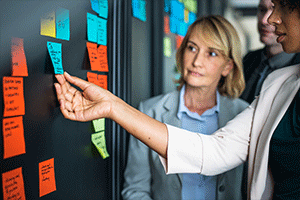In the winter of 2019, the one thing every business needed to be better at (although perhaps most didn’t know it) was ‘horizon scanning’. In the mad scramble following the declaration of the pandemic, it was clear that organisations of every type and size often lacked the level of predictive insight and awareness that could have better prepared them for Covid-19. Suddenly, there were so many interconnected questions to answer: were their people able to operate, businesses able to trade, production lines able to stay supplied – and all of this somehow safely.
Businesses and organisations increasingly operate in an environment characterised by regular periods of disruption. Environmental and climate risks are causing more frequent extreme weather, disrupting operations and once solid supply chains. Corporate hacking and cyber threats are proliferating. And then there are all the emerging commercial trends to keep track of and changing customer behaviour to understand and respond to.
The organisations best set-up to thrive in this environment is likely to be those that understand both internal and external risks to their business and are sufficiently adaptable to operate effectively when sudden material changes occur. The role and value of insight capability that can enable decision-makers to plan and prepare is now incredibly clear, particularly as the leading voices in global health predict other epidemics as globalisation continues to give viruses the chance to spread worldwide.
Learning from the past, present and future
When Arup help clients to build the resilience of their organisations, they always emphasise that analysis has to combine hindsight about the past, insight about the present and foresight about the future. Maximum value can be obtained when you combine all three, enabling you to make truly insightful decisions about what needs to change.
Arup believes that genuinely effective insight capability is only possible when you understand what you do, and don’t know about your organisation. Let’s imagine a fictional company, and explore the three facets of insight they need to develop.
It’s a couple of years after Covid-19, and “Medexaco” – a medical devices firm is trying to understand why it was so slow to respond to the pandemic’s challenges to its business. Given their sector and the nature of the crisis, why did they lag behind other companies in their response?
The company’s board is clear-eyed about one thing: the company clearly lacked ‘adaptive capacity’, were overly reactive, and were in effect only setup to respond to a crisis once it was too late. In hindsight, the organisation had had low awareness of business risks and opportunities, with particularly low scores in situational awareness and foresight and also a lack of clarity around vision and values.
Read more about this on their website.

